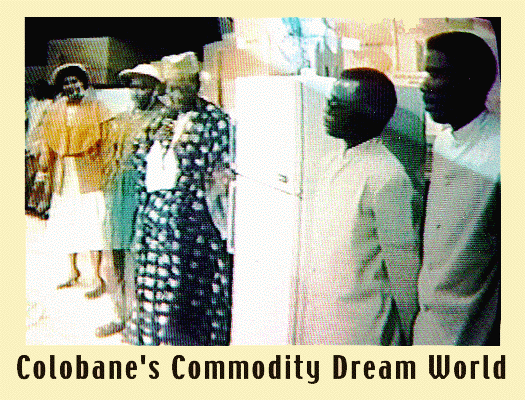the very notion of hybridity may be generated by a dominant nostalgia for authenticity and homogeneity. Some people are perceived as participating in different cultures (African "and" French, or Muslim "and" French, for example), although they may feel that their (one and unique) culture is simply . . . a combination of what others think of as different and sometimes incompatible cultures. . . . [a misconception generated by an] inability to understand culture as one complex and internally divergent whole. (174-75)
Where The Ends of the Earth attributes the social catastrophe of a progressively nonreproductive global capitalism to "natural" factors external to its logic, postcolonial theory misreads this logic itself as if the globalized exchange of culture and identities were not bound to the same acutely dysfunctional system that replaces older, bad forms of cultural-nationalist "essentialisms" with newer, ever more sinister ones. Postcolonialism forgets, or never grasps, that the flip-side of "hybridity," "diasporic consciousness," etc. is the post-catastrophic holocaust of "monetary subjects without money." ( 7, para20)
Larsen's implied antidote to this allegedly poststructuralist aporia is, of course, a concrete Marxist-materialist framework capable of acknowledging "the full, contemporary historical reality of global capitalism" (6, para. 15, my emphasis).

 theorized as the corporate-driven propagation of a "culture-ideology of consumerism." Sklair starts from the fundamental premise that human beings have always sought out that which they need for biological survival (food, shelter, etc.), and consequently, any attempt to sell goods extraneous to those needs must necessarily mobilize promotional mechanisms designed to produce a simulacrum of "necessity" for the goods in question. As Sklair points out, this is reflected in the primary marketing strategy employed by transnational corporations seeking to expand into territories outside the already-industrialized world: "projective advertising," which aims to create consumer markets by inducing "needs" for mass-produced commodities in the collective imaginaries of Third World populations. In a remarkable scene following Draman's search for a sanctuary, Mambéty provides what seems to be[7] a surreal depiction of the "dream world of mass consumption"[8] upon which such fantasies hinge. The whole town has descended on a newly-erected amusement park; music is playing everywhere as people dance and sing praises for Linguère Ramatou. As great bursts of fireworks explode overhead, the women of the town have gathered around a stage in the middle of the hullabaloo, where an enormous stockpile of refrigerators, rotating fans, and televisions are being given away: "presents" from Linguère. Apparently facing a TV camera, one woman points to the various items on stage while a man holding a microphone (the "host" of this game show in which everyone is a winner) hails the various qualities of the commodities, the most important of which seems to be that they are imported. One at a time the women of the town go on-stage to tell the man with the microphone which items they wish to acquire--even Khoudia Lo, Draman's wife, who takes the entire stockpile for her store and yet seems either oblivious or unconcerned that the goods are only available to her because of the credit earned on her husband's imminent death.
theorized as the corporate-driven propagation of a "culture-ideology of consumerism." Sklair starts from the fundamental premise that human beings have always sought out that which they need for biological survival (food, shelter, etc.), and consequently, any attempt to sell goods extraneous to those needs must necessarily mobilize promotional mechanisms designed to produce a simulacrum of "necessity" for the goods in question. As Sklair points out, this is reflected in the primary marketing strategy employed by transnational corporations seeking to expand into territories outside the already-industrialized world: "projective advertising," which aims to create consumer markets by inducing "needs" for mass-produced commodities in the collective imaginaries of Third World populations. In a remarkable scene following Draman's search for a sanctuary, Mambéty provides what seems to be[7] a surreal depiction of the "dream world of mass consumption"[8] upon which such fantasies hinge. The whole town has descended on a newly-erected amusement park; music is playing everywhere as people dance and sing praises for Linguère Ramatou. As great bursts of fireworks explode overhead, the women of the town have gathered around a stage in the middle of the hullabaloo, where an enormous stockpile of refrigerators, rotating fans, and televisions are being given away: "presents" from Linguère. Apparently facing a TV camera, one woman points to the various items on stage while a man holding a microphone (the "host" of this game show in which everyone is a winner) hails the various qualities of the commodities, the most important of which seems to be that they are imported. One at a time the women of the town go on-stage to tell the man with the microphone which items they wish to acquire--even Khoudia Lo, Draman's wife, who takes the entire stockpile for her store and yet seems either oblivious or unconcerned that the goods are only available to her because of the credit earned on her husband's imminent death.

 and one Colobane native, the former judge, sporting sunglasses and a European-style suit (the only one of the group to speak Wolof). However, while the group is in some sense international and at least biracial, it can hardly be considered the product of a cultural or linguistic métissage, for there is no dialogue either among them, nor between them and Linguère. The former judge is the only one of the entourage to speak at all in the film, but they are all more servants than companions of Linguère, doing her bidding in silent obedience.
and one Colobane native, the former judge, sporting sunglasses and a European-style suit (the only one of the group to speak Wolof). However, while the group is in some sense international and at least biracial, it can hardly be considered the product of a cultural or linguistic métissage, for there is no dialogue either among them, nor between them and Linguère. The former judge is the only one of the entourage to speak at all in the film, but they are all more servants than companions of Linguère, doing her bidding in silent obedience. destructive social order, is also a victim. Indeed, Linguère's case thirty years earlier could be considered as a quintessential example of what Lyotard calls a différend (a litigation in which the plaintiff's tort, or "wrong," cannot be adequately articulated within the idiom in which judgment is passed). Silenced by the dominant juridical discourse, Linguère would have no justice until attaining enough buying power to enforce retribution for her tort (although it is arguable whether or not this enacts any real change in the juridical idiom). In some ways, Linguère even seems to embody the land itself--or at least its transformation by the very impetus toward modernization she simultaneously seems to represent. It is thus significant that her relations with the outside world take shape through the commodification of her own body and its circulation across international borders. Her enforced exile might then allegorically suggest the mass exportation of natural resources characteristic of the role played by so many African countries within the world economy. Just as the raw materials that leave countries like Senegal for processing in the "developed world," Linguère returns to Colobane transformed by industrial technologies into a simulacrum of her former self, sporting a golden leg and hand, and bringing with her a host of imported commodities. In this light, her entry into a life of prostitution--precisely that which has allowed her to accumulate enough wealth to purchase Colobane--would serve as a powerful metaphor for an endemic exploitation of the feminized "body" of the African continent: a local response to postcolonial sub-Saharan Africa's marginal position within the global system.
destructive social order, is also a victim. Indeed, Linguère's case thirty years earlier could be considered as a quintessential example of what Lyotard calls a différend (a litigation in which the plaintiff's tort, or "wrong," cannot be adequately articulated within the idiom in which judgment is passed). Silenced by the dominant juridical discourse, Linguère would have no justice until attaining enough buying power to enforce retribution for her tort (although it is arguable whether or not this enacts any real change in the juridical idiom). In some ways, Linguère even seems to embody the land itself--or at least its transformation by the very impetus toward modernization she simultaneously seems to represent. It is thus significant that her relations with the outside world take shape through the commodification of her own body and its circulation across international borders. Her enforced exile might then allegorically suggest the mass exportation of natural resources characteristic of the role played by so many African countries within the world economy. Just as the raw materials that leave countries like Senegal for processing in the "developed world," Linguère returns to Colobane transformed by industrial technologies into a simulacrum of her former self, sporting a golden leg and hand, and bringing with her a host of imported commodities. In this light, her entry into a life of prostitution--precisely that which has allowed her to accumulate enough wealth to purchase Colobane--would serve as a powerful metaphor for an endemic exploitation of the feminized "body" of the African continent: a local response to postcolonial sub-Saharan Africa's marginal position within the global system.